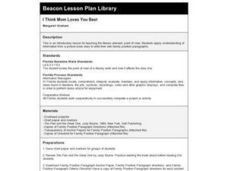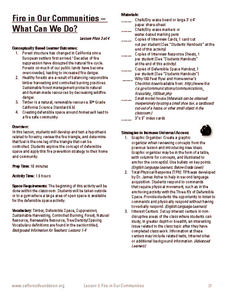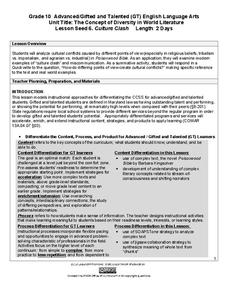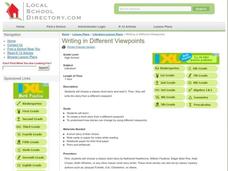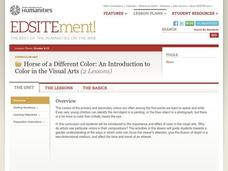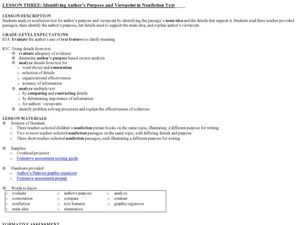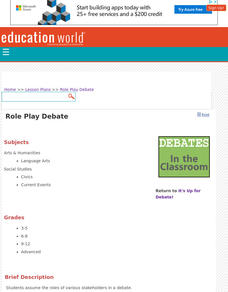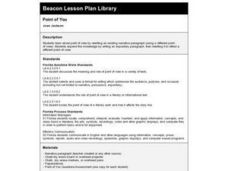Curated OER
I Think Mom Loves You Best
Sixth graders listen to, "The Pain and the Great One", by Judy Blume. They discuss advantages and disadvantages to having a particular position in a family. They write a paragraph from the main character's point of view.
Curated OER
Civil War Research
Eighth graders research different aspects of the Civil War using various multi-media techniques. Students create a report based on their research that includes views of the war from the point of view of the North, South and slaves.
Teach Engineering
Pointing at Maximum Power for PV
Following detailed directions, teams collect the voltage and current outputs of a photovoltaic cell by adjusting the resistance. Using the collected data, they determine the highest power output. Implications for weather and a large...
Teaching Tolerance
Thanksgiving Mourning
Two primary sources, a speech, and an article provide tweens and teens with different perspectives of the American Thanksgiving holiday. After analyzing Wamsutta James' suppressed speech and Jacqueline Keeler's article, class members use...
Digital Public Library of America
Frederick Douglass and Abraham Lincoln
Frederic Douglass and Abraham Lincoln, although dissimilar in their backgrounds, were united in their views about slavery. A set of 14 primary sources permits scholars to examine the views of these two powerful men.
Digital Public Library of America
Fannie Lou Hamer and the Civil Rights Movement in Rural Mississippi
Good primary resources, offering different perspectives on important issues and events, are hard to find. A packet of 12 primary source images, videos, audio recordings, records, and newspaper articles related to the 1960s civil rights...
American Institute of Physics
African American Physicists in the 1960s
Physicists Herman Branson and Tannie Stovall provide young scholars with two very different perceptions of the status of African American physicists in the 1960s. After reading and comparing the bios of these two men, class members read...
Curated OER
The Good, the Bad, and the Goofy
Upper elementary learners read about jobs on a cattle drive and the lives of cowboy during U.S. Westward Expansion. They create a "Help Wanted" poster for one of the jobs. After reading primary source accounts of cowboys, they write...
Forest Foundation
Fire in Our Communities - What Can We Do?
Learn about defensible space and renewable resources with a lesson about forest fires. After exploring the ways that humans have impacted the environment, kids conduct mock interviews about differing points of view in the conservation...
C-SPAN
Electoral College Pros/Cons and Alternatives
If every vote counts, why do we need the electoral college? Middle and high schoolers study the Constitutional precedent of the electoral college, as well as its place in historical and modern elections, with an engaging social studies...
Library of Congress
Uncle Tom’s Cabin and the Fugitive Slave Act
From the time of its publication, Uncle Tom's Cabin has been controversial. To better understand the debate, class members first examine a broadside decrying the Fugitive Slave Act of 1850, and then two newspaper reviews of the...
Ohio State University
Lesson Plan on China
Scholars ponder the beliefs of Confucianism. After reading several sayings made by Confucius, participants complete a chart filling in what each saying means using their own words. Using the same quotes split in half, pairs match...
Maryland Department of Education
The Concept of Diversity in World Literature Lesson 6: Culture Clash
To prepare for a Quickwrite on the question, "How do different points of view create cultural conflicts?" class groups draw examples of religious, cultural, and political conflicts from Things Fall Apart and The Poisonwood Bible to use...
Curated OER
Varied Beginnings: Research Process / Narrative Writing Techniques
What's the best way to start a story? Learners write a memoir using effective openings. They research the process and work through a list of hooks to use in their writing. They use at least two hooks to begin their personal memoir. A...
Curated OER
Presenting Constitutional Issues in a Non-adversarial Mode
Students study the Fourth, Fifth, Sixth, Eighth Amendments to the US Constitution. They apply different points of view to their research and present their finding to the class.
Curated OER
Writing in Different Viewpoints
Students read and analyze the point of view of a selected classic short story. They take notes while reading the story, select a character, and rewrite the story from a different viewpoint.
Curated OER
Horse of a Different Color: An Introduction to Color in the Visual Arts
Students identify ways in which the artist uses color to draw the view's attention to points within the composition and creates a sense of depth. They discuss the effect of color on the tone and mood of an artwork.
Curated OER
Creating A Different Point Of View
Students explore Indian marriage customs and culture.They connect and compare their own experiences with the experiences of characters from the short story Diamond Dust and rewrite a scene from the story from another point of view.
Curated OER
Identifying Author’s Purpose and Viewpoint in Nonfiction Text
Why do people write books? Pupils discover how to identify the author's viewpoint. They read non-fiction passages their instructor selects (the plan has the class look at nonfiction children's picture books), and then identify the...
Curated OER
The Treaty Trail: Examining an Artist's Perspective
Elementary school leanrners examine artwork from the time period of the United States and Native American treaties. They discuss the causes and effects of the treaties being signed. They also examine how cultural perspective influences art.
Curated OER
Preserving Our Barns
Students examine the different points of view when it comes to preserving barns. Using the internet, they work together to identify the risk involved in renovations and a barn in their local town that needs to be renovated. They create...
Curated OER
Role Play Debate
Suggested topics for a role play debate include school uniforms and culpability for drunk driving, but any issue of interest to your class will work. What are the hot issues in your community or on the news right now? Class members...
Curated OER
Point of You
Sixth graders study point of view by rewriting an existing narrative paragraph (using a different point-of-view). They expand this knowledge by writing an expository paragraph, then rewriting it to reflect a different point-of-view.
Prestwick House
Understanding Language: Slant, Spin, and Bias in the News
We live in a time of fake news, alternative realities, and media bias. What could be more timely than an activity that asks class members to research how different sources report the same topic in the news?


